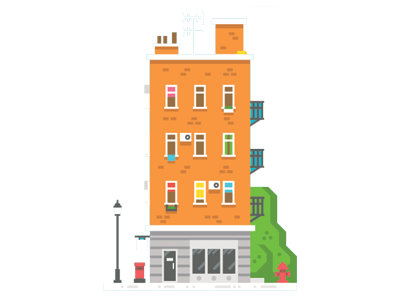Key Takeaways
- You are legally bound to buy the property once you win the bid.
- If you pull out after exchange, you lose your 10% deposit and are liable for the seller's costs.
- There is always a reason why the property wasn't sold on the open market for the full market value. Read our - Tips for buying at auction property
- You get limited information and rarely get replies to additional enquiries.
- You don't make money on every auction purchase.
- Mortgage lenders may not agree to lend on the property due to the structural defects or defects on the title.
Buying property at auction risks are huge, as there is always a reason why the property wasn't sold on the open market such as:
- the property was repossessed by the lender
- the property isn't able to be mortgaged due to a structural or legal issue
- the sellers don't have enough evidence to prove title ownership of unregistered property
- the property is in an area effected by local developments which will reduce the value of the property
Unlike a standard purchase, where you do your due diligence before you exchange, with auctions you're contracted to buy the property at the point you win the bid and there are very few reasons for getting out of the purchase (such as misrepresentation). This means if you pull out, you lose your 10% deposit and are liable for the costs of the seller and potentially other remedies.
The good news is that the risks of buying a house at auction can be reduced through investigating the
Pre-Auction Legal Pack and by also undertaking a
RICS survey of the property prior to bidding at auction. The challenge is that you are often short on time and need to be prepared to pay for legal and survey costs on a property you may not then bid on.
This article is going to help you review the different documents in the legal pack, spot costly defects/issues that'll erode your margin and flag the hidden auction costs you'll be liable for.
|
Freehold Pre-Auction Report Review
|
|
|
|
£299 INC VAT
|
|
Leasehold Pre-Auction Report Review
|
|
|
|
£480 INC VAT
|
The legal risks of buying a house at auction
There are more potential issues with a leasehold than a freehold, so we'll review the key issues to look for and where to look for them:
|
- Breach of restrictive covenants. Contained in the freehold title, either in the office copy or the original conveyance, are restrictive covenants of how the land can be used. Restrictive covenants will include redevelopment and use of the land. Where the current owner has breached these, the breach passes on to you. To remedy the breach, you'll need to contact the original land owner in the conveyance, or their survivors, and obtain their consent to vary the title. Where this is not achievable, you'll need to obtain adequate indemnity insurance before your lender will agree to lend to you.
- Possessory Title. Possessory Title is where the actual ownership of the land/freehold you are buying, or that you own, is debatable and technically subject to challenge. It arises because an owner doesn't have enough documentary evidence to prove that they are the owner of land, such as the deeds or the original purchase documents. Read more - What is a Possessory Title?
- Grant of Probate sale. The legal owners of the property have died and the property is being sold by the Executors/Administrators. The information you are provided is limited as the Executors/Administrators may not have lived at the property. Read more - Probate Sale - Top tips for buyers and sellers
| - Check the length of lease. A lease of 80 years or under will reduce the number of mortgage lenders who will provide finance on the property. If it's under 70 years, then you'll have next to none. You can ask the seller to serve a Section 42 Notice on the title. Read more - Buying a flat with a short lease and how to extend lease
- Check the ground rent. Some ground rent clauses can mean mortgage lenders won't agree to lend unless there is indemnity insurance taken out or the clause is updated via a deed of variation.
- Leaseholder Rights. You may find the lease doesn't grant you the right to let out the property or use it as an AirBNB. You could even be excluded from making internal refurbishments or having pets. If any of these are breached, then as the new owner, you'll be in breach of the lease terms and could give rise to the Freeholder taking action for breach of lease and ultimately forfeiting the Lease.
- Cladding. If the auction is for a flat that is higher than 18 meters / 7 storeys, you'll need to check the Form EWS1 External Wall Fire Review to confirm if the block doesn't have any cladding issues.
|
Cash Buyers Beware
If you are a
cash buyer (ie, purchasing the property without any mortgage finance), then you are free to proceed with the purchase regardless of what issues there are with the property - this is a risk you can choose to take.
However, if you are intending to purchase the property with
Bridging Finance, or mortgage, or you intend to mortgage the property shortly after completion of the purchase at auction, it is unlikely that you will be able to obtain the same without first resolving issues with the property. This is why you should check to see whether your lender will agree to lend factoring in the condition of the property and the legal title.
The structural risks of buying a house at auction
The main risks with structural defects are that you may have an unsafe property to live in and or the property has a defect which will stop you getting finance on the property. Here are some defects to look for and the tell tale signs:
- Movement/Subsidence. Look for vertical cracks inside and outside of the property that are larger than the thickness of a 50p. You'll spot this above doors, windows or in the walls. The cost to fix subsidence through under pinning is £10,000 to £70,000. Read more - What is Subsidence?
- Damp. Bubbling/flaking plaster low to the ground, mould round windows or smell of damp/mould. Damp can be caused by a variety of factors, such as poor insulation. The costly causes relate to a breach in the damp proof course and there being rising damp. Read more - What is Rising Damp?
- Concrete Build. Concrete built properties, often bungalows, are difficult to mortgage. Read more - The risks of a Concrete House











